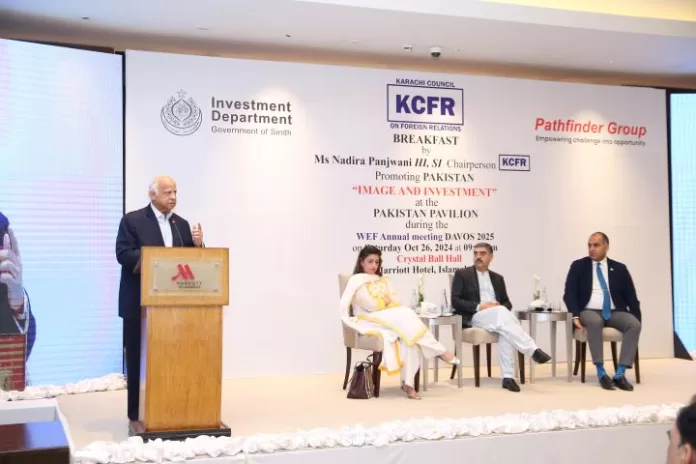
Dr Huma Baqai, Moderator Sr. Vice Chairperson, KCFR
Assalam U Alaikum and a very warm welcome. Good morning. I would like to take this opportunity to give you an overview of why we’re here and what Davos is all about. Many of you know that the World Economic Forum is held in Davos, where global policymakers come together to set the themes for the coming years. It’s here that many terms we frequently hear, whether about climate change, geopolitics, shifting economic dynamics, or the trust deficit in the world, are coined. There’s one man quietly representing Pakistan at Davos, Ikram Sehgal. For almost two decades, he has been a dedicated “lone warrior” or flag bearer for Pakistan there. It was suggested, including by myself that we should tell people here in Pakistan about his contributions.The journey began with the Pakistan Breakfast. In 2018, we expanded by introducing the Pakistan Pavilion, a space to showcase Pakistan and invite visitors from all over the world to learn about the positive developments happening in Pakistan. Often, the global image of Pakistan isn’t favorable, but through the Pavilion, we’ve been able to share a more positive perspective. The reason Ikram Sehgal has given me this opportunity to speak to you today is that I have been involved in Davos for four years, attending in 2018, 2019, 2022, and 2023, with the next event planned for January 2025. This initiative is largely private sector-driven, but running both the Pakistan Pavilion and Breakfast events independently is no small feat. It requires significant effort and investment. Initially, we had the support of Martin Dow. However, after the passing away of Mr Javed Akhai, its senior management and owner, Martin Dow ceased sponsoring the event. We thought it might be difficult to continue yet, to his credit, Ikram Sehgal kept it going.
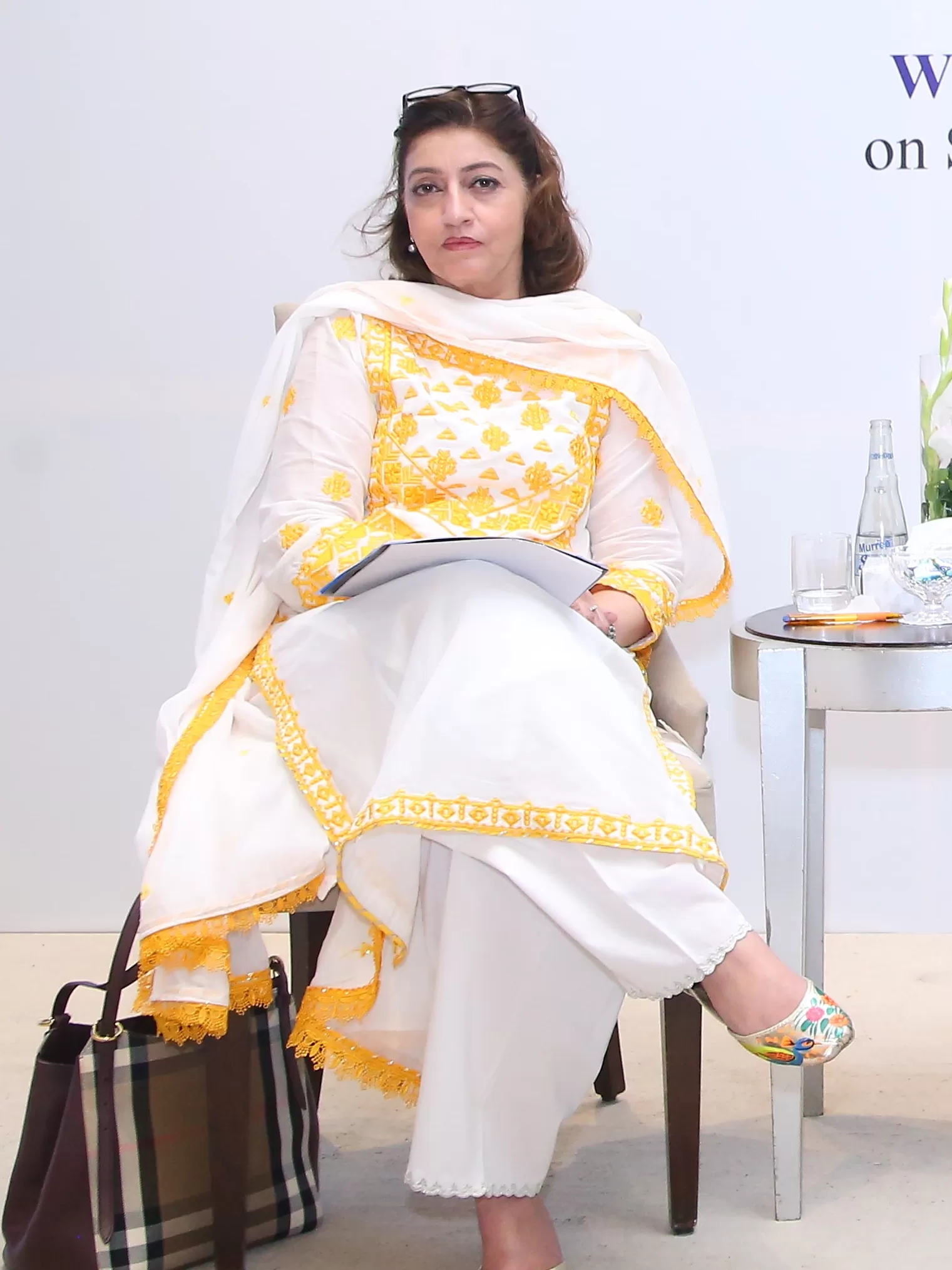
Today, the Pakistan Breakfast remains one of the well-attended events at Davos. It’s always a full house, drawing both Pakistani media and top leaders, including at times, Prime Ministers. We’ve had Shahid Khaqan Abbasi there, we’ve had Imran Khan there, and we have had Bilawal Bhutto there. He wasn’t a Prime Minister or even a Foreign Minister then, but people said that Bilawal Bhutto was launched at Davos. There’s a whole list of people who’ve been to Davos, and Ikram Sehgal has allowed these amazing individuals a forum to project Pakistan. Why is this so critically important? I think it’s vital for those of you who’ve been there and those of you who would like to participate in this wonderful exercise, which is an experience in itself.
It’s not just about becoming a part of Davos and promoting Pakistan, it’s also about seeing how the world is run, what theme building is all about, the kinds of discussions taking place, and meeting people you’ve only read about or seen in videos who are there giving sessions. Many of these sessions are largely free. I’ve attended a lot of them. This is an opportunity to be there.
In fact, I had requested Ikram Sehgal that we should have a roadshow, so we conducted a similar event in Karachi, and now here we are in Islamabad. This was all about how it started, why it started, and why it is so critically important for more people to become a part of it. I’m going to quote something: “Pakistan should be projected somehow, and the Pakistan Pavilion is an experiment in that direction.” Nationals from various countries and heads of some companies are coming to see what Pakistan offers to the world. These are the words of Ikram Sehgal, Co-Chairman of the Pathfinder Group and founder of both the Pakistan Pavilion and the Breakfast at Davos. I’ll tell you there are other entities present, but they primarily project their own companies, which is good. However, largely, I think Ikram Sehgal works to project Pakistan.
It is time that more people, especially from the private sector, join him because the themes discussed there are amazing. They included fighting the pandemic, climate change, and gender equity, as well as addressing misperceptions about women in Pakistan. I’ve had men and women from across nationalities in Davos come up to me and ask, “Are you really from Pakistan?” I replied, “Yes, we are really from Pakistan.” Banking inclusivity has also been discussed. We flew some top-notch bankers from Pakistan, who joined us there and showcased our initiatives, which is one of the biggest and most groundbreaking projects that Pakistan has undertaken. I’m extremely grateful to Ikram Sehgal for making the Karachi Council on Foreign Relations a part of this initiative because I believe it is the only think tank in Pakistan represented at Davos. We’ve been holding sessions at the Pavilion under the banner of the Karachi Council on Foreign Relations (KCFR). I have conducted sessions at Davos for KCFR, which is now globally recognized because we could take it to Davos. It’s not only about KCFR, any entity that chooses to partner with us and get showcased at Davos is opening doors for itself.
This year’s theme is education, and we are looking forward to it. I have spent 30 years in that sector. Ladies and gentlemen, for those of you who understand how things function in Pakistan, the private education system is collapsing at the primary, secondary, and tertiary levels. Universities are without funding, labs are without funding. Sciences are being taught without students having a chance to experiment, and tech is being taught without computers.
I believe the only sector that can save Pakistan is the private sector, where there is a need for investment to showcase efforts and become permanent, important, and relevant. Those doing fabulous work in the private education sector in Pakistan are sometimes strangulated instead of being encouraged and supported, and that needs to change. The presence at Davos allows you to do just that because, in Pakistan, we have a problem, we will only get recognized when others recognize us, particularly when the Western world acknowledges us.
That was one thing I wanted to speak to you about. More importantly, I also want to tell you that the Sindh government has supported this initiative. They’ve supported KCFR, and we are bringing the Sindh Investment Board on board, which will also be represented at Davos. In Sindh and elsewhere, this is a good time to become a member of KCFR and be part of what happens at Davos.
I’m going to end on a very interesting note. We had Shahid Khaqan Abbasi as a speaker at the Pakistan Breakfast at Davos, and while we always have a Q&A session— for example, Bilawal Bhutto had a fantastic Q&A session there and was actually hailed as a statesman—it was at Davos that the groundbreaking launch of Bilawal Bhutto happened. Shahid Khaqan Abbasi was asked, “Why doesn’t the government do something about it? Why is it just the private sector?” By the way, in other countries, the private sector is present, but it is heavily supported by the government. Indonesia has a fabulous Indonesian night. If you remember, for those of you who have been there, an entire street is dominated by India. Twenty-seven states from India are represented on that one street.
There is the Tata stall where we all have tea, and they also project India. It’s literally surrounded by an India-centric atmosphere. Those are the new fronts that we need to break, and Davos is a fantastic place to do it. But coming back to what I wanted to say. This question was asked to Shahid Khaqan Abbasi, why is the government not doing something? He replied, “It’s good that they are doing nothing.” He said it’s happening the way it is because the private sector is doing it.
I’ve seen this firsthand four times, and I know the kind of effort it requires to pull it off. We need more of you to come forward and support Davos, support Pakistan, and support the Pakistan Pavilion. I think we should have a Sindh Pavilion, a KPK Pavilion, a Balochistan Pavilion, and a Punjab Pavilion. We have so much to showcase, and our private sector has so much to offer. It’s time we put our money into it.
Looking ahead to 2025, we are excited about having a fabulous Pakistan Pavilion and Pakistan Breakfast. I think that’s critically important. What came forward from the video that was just shownis that this forum is apolitical. Each and every political party is represented when they represent Pakistan at Davos. We invite them, and they have graciously agreed to be there. Imran Khan has attended four times, three times in the Opposition and once as the Prime Minister. While the Prime Ministers have agreed to be there, the government has been less forthcoming, which is unfortunate. Even the Pakistan government’s presence at Davos takes them forever to come to the Pakistan Pavilion. It takes them forever to come to the Pakistan Breakfast, although the Pakistan Breakfast is always full. We have requests coming from all over the place, and we have to decline some of them due to lack of space.
The event is widely covered by the media, and the Managing Director of the World Economic Forum always makes time to be there. Despite that, our governments are not as forthcoming. Of course, the Prime Ministers and our guests grace the occasion, but that has been a pain point. I don’t even know if Ikram Sehgal is happy about me saying so, but that is a fact I’ve witnessed myself.
Ladies and gentlemen, another huge support and partner of ours is the Swiss Asian Chamber of Commerce, as you saw represented in the video. I am now going to request Farhat Ali, the former President of the Swiss Business Council, to come and say a few words.
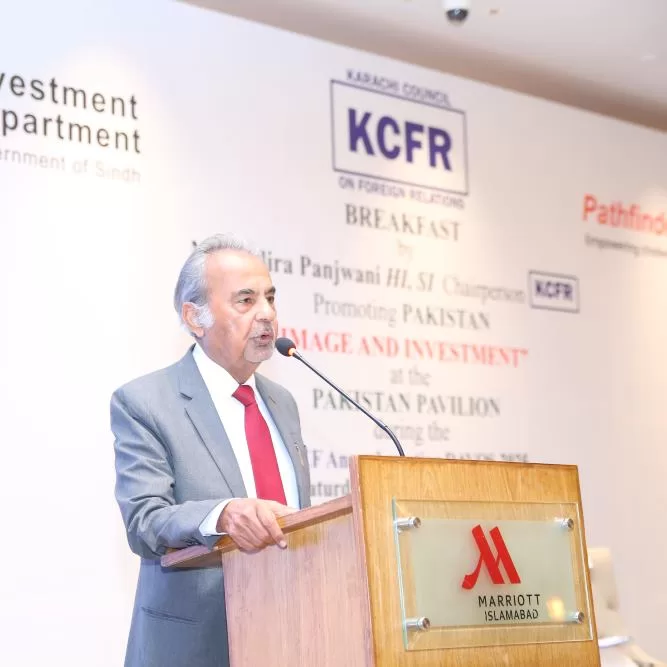
Farhat Ali Founding President & Member of the Board of the Swiss Business Council of Pakistan
Ikram Sehgal, Excellencies, ladies and gentlemen, in the next few minutes at my disposal, I will speak about Switzerland and Pakistan’s business opportunities and World Economic Forum engagement. Much good has already been rightly said about the World Economic Forum meeting at Davos, and I would like to add a bit to it. I have had the opportunity to participate in the World Economic Forum event at Davos multiple times through the common platform of the Swiss Business Council of Pakistan and the Swiss Asian Chamber of Commerce of Switzerland. The Swiss Asian Chamber of Commerce has been regularly cooperating with the Pathfinder Group for their events at Davos. Attending sessions on complex global issues, blended with casual but meaningful meetings with prominent global leaders, has always been a profound experience that otherwise, at such a level and in such a short time, would not have been possible.
The signature Breakfast event organized by the Pathfinder Group at Davos is viewed by many of us as Pakistan’s branding and identification at Davos and perhaps the only one. This brave group, at its own resources, has been carrying the Pakistan flag at Davos for over two decades. I must say with disappointment that the excellent platform provided by the Pathfinder Group at Davos for global outreach is not being leveraged by the Government of Pakistan nor by the business groups of Pakistan. The government can gain by improving the country’s perception, and the business groups can use this platform to globalize, as many emerging markets like ours have accomplished through this one-of-a-kind forum at Davos.
It provides a rare opportunity to build up country perception, enhance visibility, and influence global discussions, allowing the country to showcase its economic potential and strategic importance by networking with potential investors, thought leaders, and policymakers, which can lead to beneficial collaborations. The same holds true for our business groups, which have been left far behind in their global outreach compared to their peers in emerging markets, whose footprints at Davos are exemplary and are reflected in their influence in the global market.
Moving on to Switzerland and Pakistan’s business opportunities, I would like to showcase the business model the two countries are pursuing to develop trade and investment among them. This model is the pinnacle of business relations between the two countries, and I’m sure the participants will find it interesting. Under this business model, the entire chain of trade and investment between the two countries is managed by the private sector at both ends, which includes the roles of business development, facilitation, and implementation, overriding all bureaucratic hurdles.
This makes all the difference. The experience over the years has been profound. The process works faster and more efficiently, yielding tangible results on the ground in a very short period of time. This initiative is governed by an agreement between the Swiss Business Council of Pakistan and Swiss Global Enterprises of Switzerland, with defined responsibilities for the two partners. The Council serves the business interests of Swiss companies in Pakistan and promotes Swiss trade and investment between the two countries. It works in partnership with Swiss Global Enterprises and the Swiss Asian Chamber of Commerce. Whereas the Swiss Global Enterprises headquarters in Zurich is an entity similar to the Trade Development Authority of Pakistan, the difference is that Swiss Global is in the private sector. Today, Swiss Global Enterprise is the official Swiss organization for export and investment promotion, functioning as a private consulting and platform organization commissioned by the Confederation and the cantons of Switzerland.
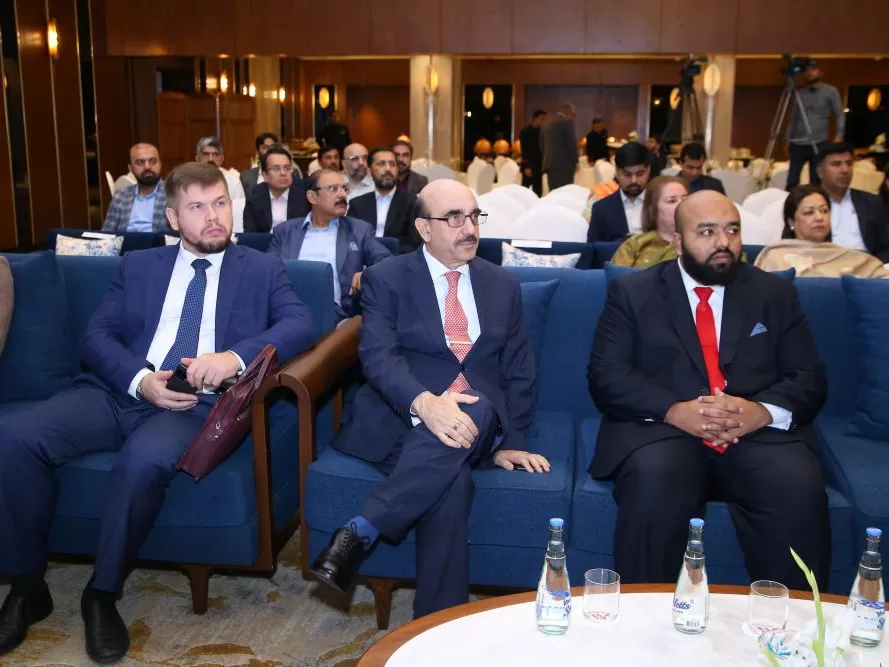
With around 200 employees in over 20 countries and more than 3,000 partners worldwide, it supports over 5,500 businesses, mostly small and medium enterprises in Switzerland and around 130 countries, with their international business development partners like the Swiss Business Council of Pakistan. Under the agreement, the role of Swiss Global Enterprises is to evaluate the needs of its member companies interested in global outreach for their businesses.
It links such companies with the Swiss Business Council under a well-defined mandate worked out between the Swiss Business Council and Swiss Global Enterprises, whereas the Swiss Business Council’s role is to mobilize and manage the footprints of assigned companies in Pakistan through joint ventures in investment and trade or technology transfer with partnering companies in Pakistan.
I may add that to serve the above, the Swiss Business Council, with the support of its Swiss partners, pursues a consistent policy to showcase the positivity of Pakistan in Switzerland, leading to business investments between the two countries. One of a series of roadshows was organized by the Swiss Business Council and its Swiss partners last month in Zurich, Geneva, and Bern, attended by Swiss companies keen to develop business and investment alliances in Pakistan. We are hopeful that this initiative will enhance Swiss footprints in Pakistan. I want to inform you about the paradigm shift in the approach of the Swiss government towards foreign trade and investment. Earlier, the export trade of Switzerland was facilitated and promoted by the Economic Affairs division of the Swiss government. It was subsequently analyzed that this function can be better served by the private sector in line with global trends and fast-changing business dynamics. Today, Swiss Global Enterprises is the official Swiss organization for export and trade.
We are happy to say that Swiss-Pakistan business is on the right track. It is focused, well-optimized, and well-managed in both Pakistan and Switzerland. Above all, the set business arrangement has set a great example of business-to-business cooperation between the two countries, overriding bureaucratic controls.
Dr Huma Baqai, Moderator
Now let’s hear from people who have been there and experienced Davos firsthand. I have, of course, been talking to you about it, but now I’m going to invite Dr Faisal Mushtaq, Chairman and CEO of the Roots Millennium Group, as well as the President of the Millennium Institute of Technology and Entrepreneurship (MITE) in Sindh. It is a unique university that has both a global wing and a national wing. They are doing some great work there. Please come down to Karachi and visit that university. Now, I present to you, Dr. Faisal Mushtaq.
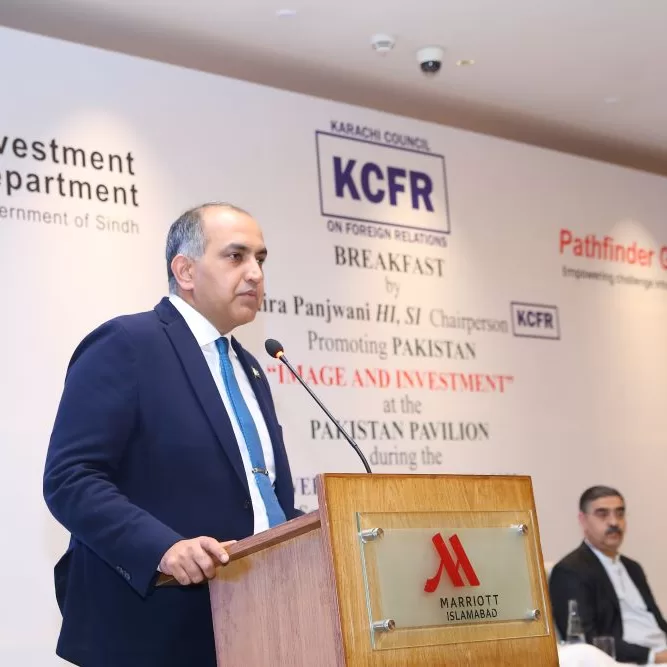
Dr Faisal Mushtaq – TI Founder & CEO, Roots Millennium Education Group
Your Excellency, former Caretaker Prime Minister of Pakistan, Senator Anwaar-ul-Haq Kakar; the esteemed Chairman of Pathfinder Group and Patron-in-Chief of the KCFR, Ikram Sehgal; Professor Dr. Huma Baqai, Director of the Millennium Institute of Technology and Entrepreneurship (MiTE); Ambassador Masood Khan, one of Pakistan’s most distinguished diplomats who has served in the United Nations, China, and the United States and as the former President of Azad Kashmir. We are now pleased to welcome him to the realm of higher education. Distinguished admirals, general officers, honourable diplomats, progressive thinkers, and friends of KCFR and the Pathfinder Group—a very good morning to you all. I am truly grateful to Ikram Sehgal for this opportunity. It is an honour to be in the presence of such distinguished individuals. With your permission, former Prime Minister, I would like to mention that since the theme for Davos next year is education, I have always believed that the 250 million people living in Pakistan are not born as citizens but as subjects.
Literacy and education transform subjects into citizens, so if nations aim to advance and stand tall among the global community, then education, literacy, human development, and social impact should be at the core of our efforts. This clearly highlights education as a thematic priority for the World Economic Forum (WEF) next year. And as I have often said—and will say again in the presence of our distinguished Co-Chairman, Ikram Sehgal—there are people, there is a planet, and then there is a motive called profit. But what good is profit if it does not benefit society?
Ikram Sehgal is one individual who has created a shadow system for giving back to Pakistan, which is why he has built partnerships for prosperity in his capacity. If he were to have a shadow foreign office, I would say that he has been, single-handedly, the Foreign Minister of Pakistan, the Foreign Secretary, and the Chief of Protocol. My generation grew up reading about Ikram Sehgal and seeing him on television. I had no access to him; we only saw him with world leaders. Today, I stand tall because 70% of your country’s population is under the age of 30, and that is where he has always focused his efforts. He believes that the younger generation needs to take the country forward. I have had the opportunity to attend both the summer Davos in Dalian in 2013 and, later, the Davos Forum in 2020 as a member of the contingent with the Chairman. I was part of the Pakistan Pavilion, and I would rightly endorse Professor Dr. Huma Baqai’s sentiment that we felt like a minority. Nevertheless, we reflected and represented Pakistan in a way that has never been done before.
Lately, Prime Ministers and heads of states have always been present, but there needs to be more government-to-government (G2G) support, more business-to-business (B2B) support, and, most importantly, private sector-led inclusive growth in the 21st century. If the private sector is not able to galvanize the momentum created by the Davos community in Pakistan, I believe they are not doing justice to a country that serves their business interests as well. Here, the motivation and nucleus have always been the Co-Chairman, Ikram Sehgal who has gone into every detail and has been a source of inspiration. Though he is a retired military officer, an aviator, I would say, Sir, you are an all-arms officer; you integrate infantry, artillery, and armour. In war games, they often say that in the event of a conflict, the first casualty is the war plan.
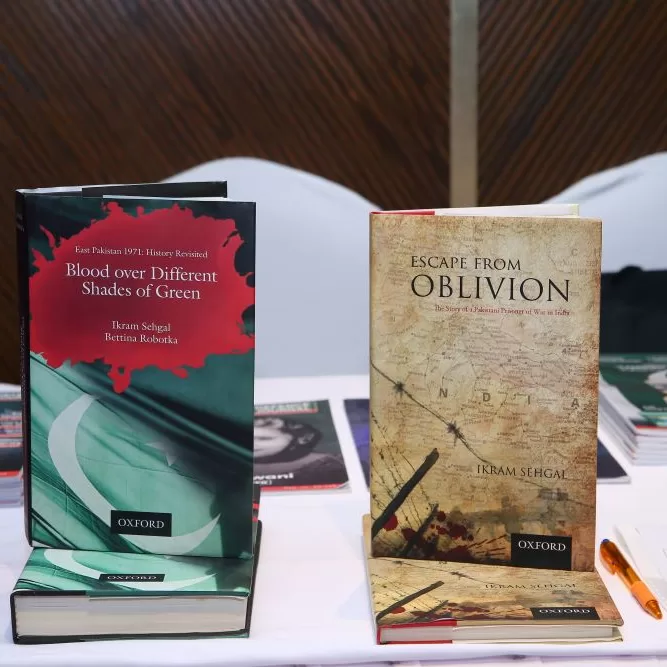
However, working with you has shown that there is always a contingency war plan, as well as a plan B and a plan C. The way he gives attention to detail is remarkable. Ikram Sehgal’s willingness to give a person like me this opportunity is a testament to his commitment to his values and vision for inspiring and mentoring the younger generation.
His inspiring son, Zarrar Sehgal, who is based in the United States, is equally committed to Pakistan. I’ve always said that you can take a Pakistani out of Pakistan, but you can never take Pakistan out of a Pakistani. Your family is one such example of national service, commitment, and passion. You are a champion, Sir, and I would like to take this opportunity to say that we will represent our group together at the Pakistan Pavilion under your auspicious leadership. Ambassador Masood Khan, Professor Dr Huma Baqai, and I will surely take advantage of this invitation, and I shall encourage people from different walks of life—public policy, the private sector, diplomats, and social networks—to build these partnerships. This is critical because you cannot build alone. You call it a reflective and representative society and a country, but you cannot achieve that without building those partnerships. Diplomacy is the first line of defence for establishing relationships with individuals, corporations, semi-government organizations, and provinces. I think we all need to rise together to support him.
Sir, please accept my gratitude on behalf of the teaching and learning community of our education group. We have benefited immensely from your patronage and your community initiatives. Recently, one such initiative was the Providentia Books Foundation, where the students of Pakistan collected their used books and donated them to a cause that is now touching the lives of young people around the world who need books much more than we do. That initiative was led by Ikram Sehgal’s granddaughter, Amani, and we are very happy to be a part of it.
In conclusion, I’ve always said that the story of Pakistan has titles, chapters, and pages. History is always written, and governments should always tell it, but the story only gets sold when people buy it. I thank you all very much.
Dr Huma Baqai, Moderator
I feel very proud that we are doing it. I would also like to tell you that I have been associated with Dr Faisal Mushtaq for three years now, and we definitely need more people like Ikram Sehgal; Dr Faisal Mushtaq is one. Slightly off the trajectory, let me narrate something to you. Some months ago, in Karachi, we held an event to launch the Millennium Institute of Technology and Entrepreneurship (MITE).
Naturally, I wanted Ikram Sehgal to grace the occasion, so my team was calling his office, trying to get him on board. They kept telling me, ‘There is a wedding in Ikram Sehgal’s family.’ I was like, ‘Who is getting married in Ikram Sehgal’s family that I don’t know?’ Then I called up Sehgal, and he said, ‘Huma, two of my employees are getting married, and I’m hosting it in Islamabad.’ And that wedding was hosted at the Serena. That’s the kind of man he is.
I have the proud privilege of inviting our Chief Guest for today, former Caretaker Prime Minister His Excellency Anwaar-ul-Haq Kakar, to come and speak to you. I also had the privilege of doing an event with him at Davos when he was a guest of the Pakistan Pavilion with the Chief Minister of Balochistan, Jam Kamal. We held an exclusive event for investment in Balochistan at the Pakistan Pavilion.
That is the kind of work that the Pathfinder Group does at Davos, and I am also very grateful to Anwaar-ulHaq Kakar for always saying ‘yes’ and coming to my events.
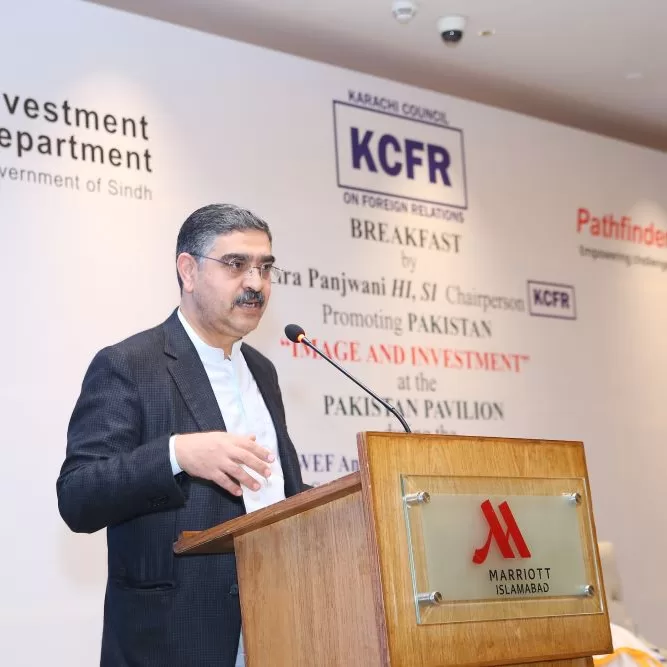
Anwaar ul Haq Kakar Former Caretaker Prime Minister of Pakistan
I won’t give a long introduction or name everyone, but not mentioning Ikram Sehgal would be a disservice to the entire idea of this community at the World Economic Forum here in Pakistan. Sir, thank you for your long association with me. I was introduced to Ikram Sehgal when I was the spokesperson for the Balochistan government, and he happened to be in Quetta at the time. I recall a small annexe on the outskirts of Quetta called Hanna Orak Annexe. We were having interaction with the then Chief Minister, and from there we just clicked, and we connected. He ushered me not just to the World Economic Forum, but he also inspired us to be the storyteller for Pakistan.
What a wonderful storyteller we have in his person, and I realized, as Dr Huma Baqai rightly recalled when we were there with the then Chief Minister Jam Kamal at Davos. That was my first experience and exposure to the Forum, and it just stimulated me. I remember that I was badly missing that global link with the parochial arrangement here in the country when I was first exposed to Davos. Sehgal, not just encouraging the entrepreneurs here in this country and creating partnerships at a national and global level, is also a person who’s quite focused on opinion-making. He realizes that, other than the material infrastructure, it is the mental infrastructure which is so important in any society.
How do you create your mental edifice? How do you shape your mental inclinations and preferences regarding cultural issues, social issues, economic issues, and political issues? And how does this impact the larger society? It is too important to be ignored, and Mr. Sehgal is the man who takes on that front and becomes someone who generates a national narrative. It’s a very daunting and challenging task, and I have always drawn inspiration from him and learned from him. Another inspiring figure is Ambassador Masood, with whom I have been honoured to work. My introduction to him was when I was the spokesperson for the Balochistan government and he visited Quetta. At that time, he was the president of Azad Jammu and Kashmir.
Dr Huma Baqai, it has been always an honour to be on your show and we will continue engaging with that. Today, when Ikram Sehgal asked me to come and speak on this occasion I was just thinking what to say. I’m someone who never believes in a structured framework of talks. I prefer to have an honest conversation rather than a clever one because in an honest conversation sometimes you reach the right conclusion in a clever conversation you just make things more elusive and at times even delusional. What I learned in this small stint of a few months is the role of the government, one thing is for sure and I’m quite certain about is that the government has no business to do business.
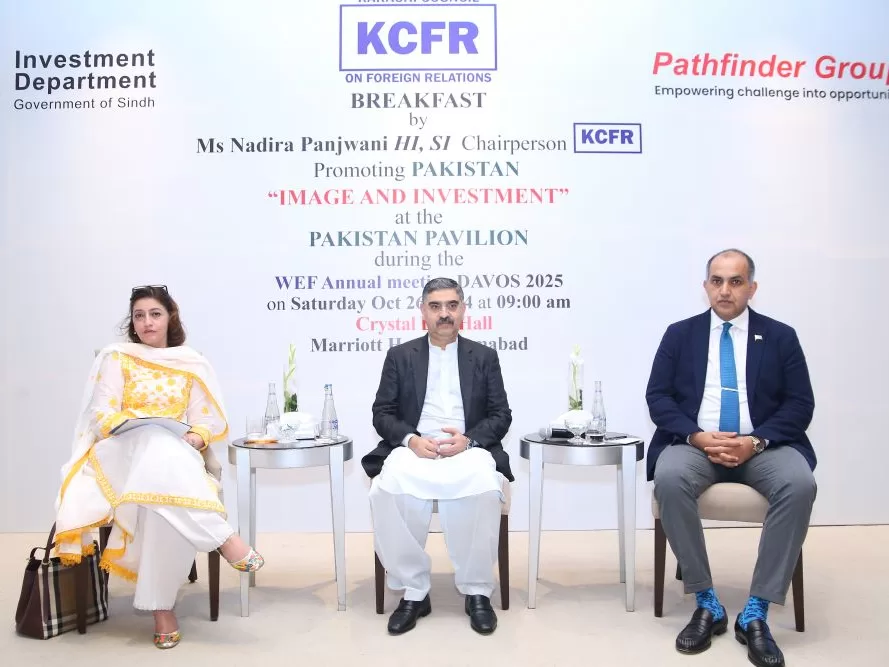
“Laissez-faire” is an idea I have bought into, and I’m religiously advocating it on all the forums. Even if we take the Chinese so-called modernization phase, what they call Chinese modernization, it is indeed what they did. They crafted and planned, post 1979, they engaged with the global rules either signing with WTO and the rest of the international institutions, having access to the Western markets or encouraging the Chinese private sector through state patronage. So, it was the private sector that brought in this transformation that brought the Chinese Dragon to become the second-largest economy in the world. It was not the Chinese Government on its own. So, what is the lesson for us? If we want to go for economic growth, if that is the goalpost, can the government-run schools or hospitals or go for all these huge infrastructure and state-owned entities? Many governments have tried—from North Africa to the Middle East, from Asia to South America—and most of them, if not all, have become weak states, with service delivery indicators that are quite poor. The countries that brought in this “laissez-faire” approach and implemented it have far better service delivery indicators.
I’m quite happy that I know we live in a very polarized and divisive environment, but I foresee—I’m inherently quite an optimistic man, I think—so we are in the grip of a societal transition. The Western Hemisphere, for the last 5,000 years of its documented history, initiated its first glory with the introduction of Caesar. Rome settled with an individualistic society, but we are still here, in the worship of our idols and our Caesars. This societal transformation, which has occurred over there is happening more slowly for us, but that is a natural flow. Until and unless these 8 billion people on this planet are not equally treated, as Dr. Faisal Mushtaq was mentioning, in the role of the citizenry—not equal in Rousseau’s sense, but equitable. Equitable in that sense that every individual at least in terms of rights is considered equal and in terms of responsibility can be assigned whatever his capabilities or her capabilities are and that transformation of the society, that egalitarian existence either with the difference of culture, religion, race, or language. It’s quite a challenging task for me to fulfill, that is it for PTI to fulfill, and that is it for PPP to fulfill, that PMLN or JUI. I think we need to move way beyond that.
Every one of us has to think of himself or herself as an important contributor, who can inspire and play the role of leadership. And that leadership can be here in the kitchen of Marriott. Who’s Gordon Ramsay? A chef, a global icon. How do we treat cooks and chefs? With a disparaging attitude! What we need is to change this attitude. We cannot assign regality to individuals or professions; we have to recognize the inherent regality of every human being by virtue of birth. This right of birth is regal, and that regality can be converted into a modus operandi, where we agree on basic rules of societal engagement. I’m not talking about politics at the moment. Pakistan is such a beautiful country, and I often wonder about our collective memory. Our collective memory is a blend of millennia of historical experiences.
When Alexander saw the opportunity to move east, he could have easily bypassed the East and, from Macedonia gone around the Mediterranean to conquer any of the Western territories. But he didn’t, because there was no incentive there. The incentive lay in Persia, in the East, between the Syr Darya and Amu Darya, in the lands of the Turkic nomads and in India, South Asia. He moved toward this rich region not just to conquer but to leave a lasting impression. To this day, some Pashtun tribes in KPK trace their origins to Alexander’s arrival—sometimes the Afridi tribe claims this, sometimes others. Even the physical appearances of the Pashtuns are said to reflect the Greek presence in this region.
Then came the Arabs, followed by the European colonizers. I know it is not politically correct to rationalize colonization, but let’s be honest—colonization has made some contributions as well. Pakistan and India were colonized, which gave us a rail infrastructure, road networks, and a common language in English. Many African colonies now speak French, and some speak Dutch. Colonization brought language, culture, and material advancements, even if only temporarily, as no colonizer can remain indefinitely.
However, they leave behind parts of what they bring with them. Nations that are generous in spirit, rather than dwelling negatively on their colonizers, often choose to take advantage of these contributions and foster healthier relationships later on. That’s what happened with Pakistan—a blend of Sanskrit, Persian, Arabic, English, and local languages brings us poetry, prose, short stories, and history. Unfortunately, this influence did not transition us toward scientific development, and here we were halted. If we had translated this knowledge base over the last 600–700 years, particularly during the Arab expansion into Spain and beyond, it might have been different.
This expansion inspired the Reformation and the Medici house in Florence, sparking the Italian Renaissance. But this progress didn’t continue here, and that stumbling block impacted the rest of the region. This gap marked the divide between East and West, a contrast that only intensified in the last 300–500 years. Our identity, however, is deeply rooted in our past. It isn’t based solely on faith; rather, it is so diverse and versatile that it can adapt, reshape, and emerge as a storyteller. This identity can captivate local, regional, and global audiences alike.
If Indians can claim they should be part of the OIC based on their sizable Muslim population, then why don’t we acknowledge the Mahabharata and Sanskrit heritage based on our Hindu population? I am from Balochistan, home to one of the most important Hindu temples, the Hinglaj Mata Temple. Hinglaj Mata carries the same significance as the Kaaba in Hindu mythology, yet we rarely explore this aspect of our heritage. Similarly, Buddhist stupas are located here; they are part of my identity as well. Yes, I am a proud Muslim and unapologetically so. My faith connects me to the larger Middle Eastern and North African fraternity, but I am not radical. I use religion as a tool to internalize and grow spiritually, helping me move “from darkness to light,” as the Ayah says, illuminating my internal blind spots. In my view, the earliest and greatest democrat was God Himself. In the story where Satan refuses to bow to His new creation, Adam, God doesn’t simply condemn him. Instead, there’s a due process: He questions Satan, asking what led him to this decision. There’s a dialogue, a process, and arguments presented, regardless of their merit. For me, this story holds valuable lessons.
Pakistan, a country of 240 million people, as I mentioned when I was at Davos, sits adjacent to 1.5 billion Chinese, with Central Asia, the North Caucasus, and Asia Minor (Turkey) nearby. The ECO countries comprise nearly 500 million people, and we also have a close strategic relationship with the GCC, which has trillions of dollars in investment bonds. This regional environment creates immense opportunities; all we need is to believe in ourselves.
The only people I’ve seen who are despondent about Pakistan are a few Pakistanis. I’ve never met anyone outside Pakistan who isn’t interested in our future or optimistic about it. I’ve had the chance to meet many global leaders, and each one takes a keen interest in Pakistan and considers it seriously. When I was at Davos this time, I didn’t realize that Schwab has been organizing this event for the last 50 years. I’ll be honest: I was unaware of the IGWEL interventions until I experienced them myself. My three interventions at IGWEL introduced me to the World Economic Forum in a way I couldn’t have imagined, even as a head of government. It was the most important and valuable takeaway from my time there.
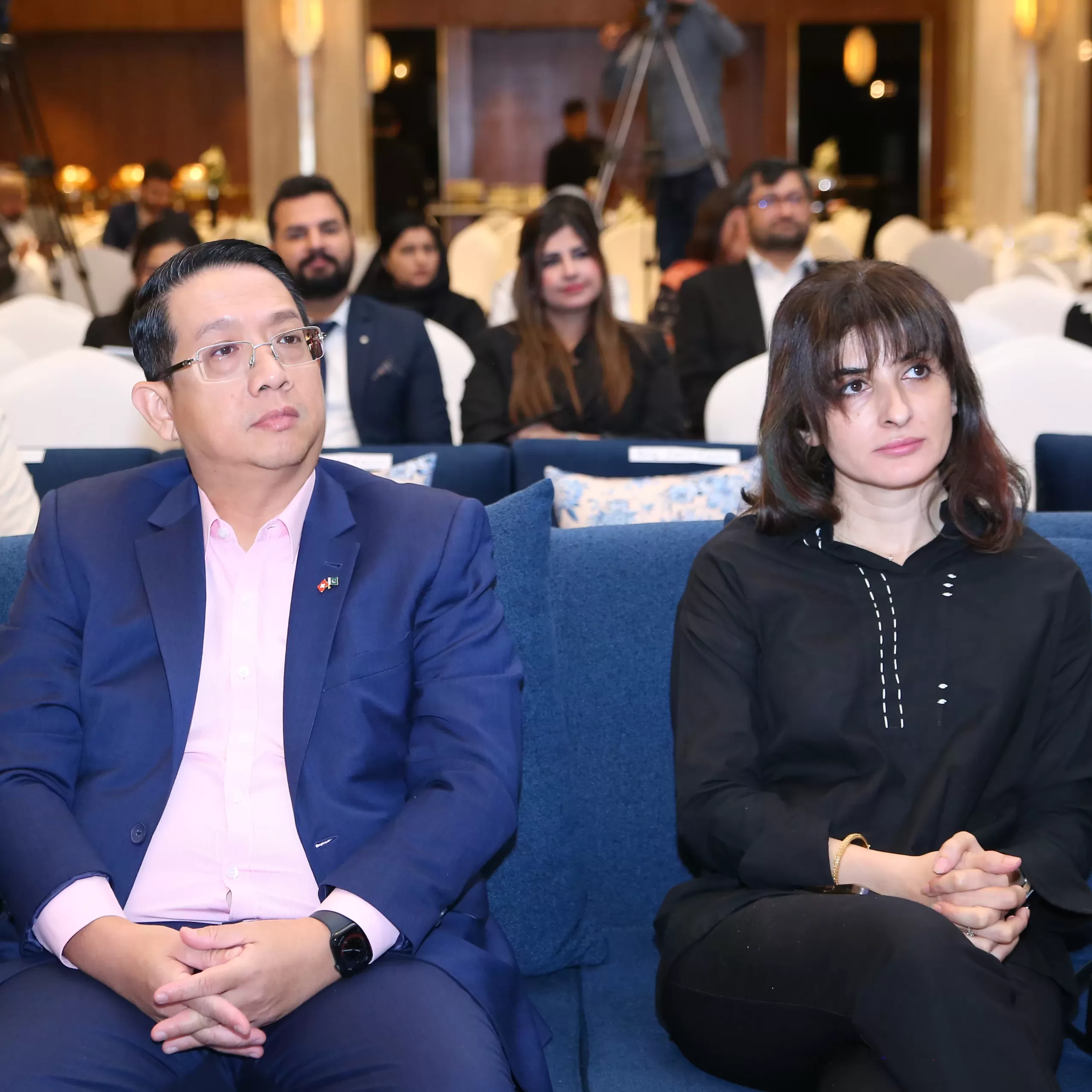
As Dr. Faisal Mushtaq mentioned, this year’s theme is education at the informal gathering of world economic leaders. I am someone who started from a very humble background. My father and grandfathers were neither Daultanas, Bhuttos, Khans, Afridis, Bugtis, nor Maris. I identify with the common Pakistani; I’m just Anwaar. I lost my mother at an early age when I was four and was raised by my maternal aunt in relatively constrained economic circumstances. We weren’t poor, but we faced challenges. Meals were there, and thanks to my late father, my sister and I could attend school. But we were never privileged children with access to everything.
I’ve struggled in my life. I know there are people who dislike me and a few who like me, but I’ve always held my own positions. You may call me a maverick or objective, with an independent mind—it depends on your personal view. But I have been true to myself. I’ve taken positions, been opinionated, believed in, and advocated for my views without hesitation. I may have held wrong opinions, views I might have reconsidered with mentors like Ambassador Masood or Ikram Sehgal. I am open to that, yet I value consistency, not rigidity, and there is a significant difference between the two. The reason I share this personal story is to highlight individualism. Society is shifting towards individualism, whether we like it or not. Political, religious, and cultural cults may seem powerful and invincible at times, but they are on the decline. This reminds me of a beautiful verse from the Quran: “Everything has to die.” We come, we dwell, we perish; we are not eternal. This is the weakest link of human existence. Our entire attempt, our struggle, is to be like God—we want to be eternal, to last forever, and that is where we fail. The natural answer to this human challenge is individualism— embracing our allotted time without seeking perpetuity, finding joy, purpose, and contributing meaningfully. We all have a limited time slot, and anyone who realizes this and makes the best of it is, in my opinion, the truly successful individual, the eternal one who leaves deep impressions beyond their time. The people remembered by history, I feel, share a common trait: they were much focused within their allocated time. They didn’t spend time contemplating how they would be remembered. It is us who judge them, creating stories and myths in hindsight about how they might have viewed things. I don’t think any truly successful individual has the luxury of thinking about how they will be perceived 1,000 or 2,000 years from now. They simply make the best of the advantages and disadvantages available to them within their given time.
Pakistan is a story of the Indus Civilization. It has a beautiful geography and beautiful people—both physically and mentally. It’s a country where you hear expressions from Baba Bhullay Shah to Shah Latif, from Rahman Baba to Khushal Khan, and Jam Durruk. Whenever I start thinking about a situation or a problem, I feel fortunate that I am, if not fully wellversed, at least quite exposed to Persian ghazals and poetry.
I find so many answers in these four or five poetic languages; they acquire the status of mentors, becoming advisers who guide me through difficult situations. This richness is part of our heritage. Who says we’re poor? Yes, the material aspect is not as advanced as it should be, but the definition of poverty needs to be defined and redefined—it cannot be associated solely with material progress. This is just one part of poverty. I’m not ignoring or delinking the two, but there is another aspect to poverty as well. I was just listening again to Ikram Sehgal, and he was discussing the military, its existence, and the role of the Chief of the Army Staff. I think it’s a very important theme in the current environment. I spoke to the War Course at NDU last Monday, and these themes came up. So, I feel it’s essential to reiterate my opinions and beliefs. There is a group in this country that believes our bond, our nucleus, the link that holds this federation and society together, is a social contract— the Constitution.
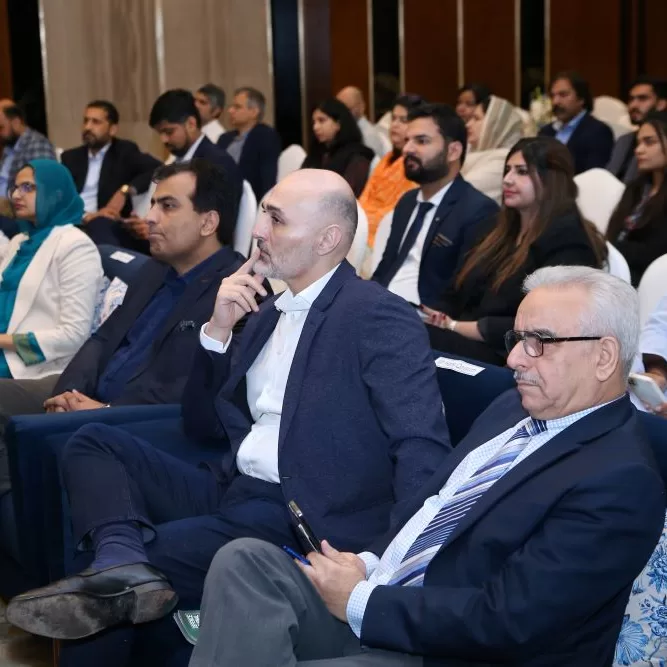
This view is widely accepted by the intelligentsia, political parties, and others with varying degrees of democratic credentials, who mostly agree on this foundation. In my opinion, however, the social order is even more critical and sacred than the social contract. Why do I say this? The skeleton of our body politic is the social order. Without a skeleton, how could we give it form? Yes, the aesthetic, ostensible, and visible part is the social contract—the Constitution—but for that to work, society must exist in order. To maintain this “skeleton,” this social order, we need a guarantor, which cannot be a social contract alone. If we take lessons from history, such as from the Magna Carta, social contracts develop slowly over time.
In English society, the Sovereign, the Monarch, was the glue, holding the order together for knights and the aristocracy. In our case, the guarantor, by design or by default, has become Pakistan’s military, with the strength of that institution relying on the nucleus of the office of the Chief of the Army Staff. As Ikram Sehgal rightly identified, you might hate him, or you might love him—that is your choice.
You may draw implications from this stance for your political or social career, right or wrong, but the sanctity of social order is critical. Some conservative historians argue that a few centuries of tyranny are better than a few weeks of anarchy. Anarchy and chaos are anathema—they are simply unacceptable.
I was having a conversation with a few learned people, and they were advocating for this view. I am not suggesting at all that we should ignore the social contract or defy the Constitution this is not what I’m advocating here. If we ensure social order, we can evolve toward a more egalitarian society that respects democracy. Even within democratic governance, there are many shortcomings. The West has already begun examining, critiquing, and working on ways to improve it further. This adaptability is what distinguishes democracy from any dogmatic ideology.
Otherwise, if we were satisfied with rigid religious dogmas, if they had to remain stagnant and treated as finished products it would stifle creativity. If we assume democracy is the final word in human thought, then we are intellectually stagnant. Even if democracy is right, let’s challenge it so that we can learn if we’re wrong. What’s wrong with exploring different ideas intellectually? We’re not committing to them; exploration is allowed.
Social order is crucial. Look at the collapse of social order in places like Syria, Iraq, or some weaker African states that cannot maintain central authority. This chaos and anarchy are worse than anything. I once shared a lighter conversation with a gentleman whose name I won’t mention as he’s well-known to many of you where we were sitting comfortably in an air-conditioned room, discussing civil unrest and chaos as if it were just around the corner. I said to him, “Sir, do you realize what happened in Iraq? Yazidi women were sold for $50. A reality check would come if, God forbid, my wife or your wife were sold for $100. Then we’d understand the real nature of civil unrest, anarchy, or chaos.” At that point, I would ask people what choices they would make about social contracts or governance systems.
A stable social and political order ensures all these things. If it’s challenged, I’m not speaking about state disintegration, but social disintegration. Look at Syria; it still has a president. Afghanistan is an ancient state with a 5,000-year history, but its society has become dysfunctional. Iraq, too, remains a state; there’s no Kurdistan or a conspiracy created by the Americans to divide it. But it’s a fractured society, fragmented along sectarian and ethnic lines, lacking a central authority to unify it.
Now, there is a debate about whether we even need governments in the future, and that’s a valid discussion. However, this concept shouldn’t apply exclusively to Pakistan. If the 8 billion people of the world decide we can live without government, then so be it. But until then, the stability provided by a cohesive social and political order is essential. I don’t see a need for a government, and I’m perfectly fine with a stateless, government-free global social order if humanity can make that transition. Who am I, as an individual, to stand in the way of such an ambitious goal? However, if this concept is applied exclusively to Pakistan, then I do have concerns. I sincerely hope we cultivate a sense of ownership because until we take full responsibility, we cannot transform our current system into a stable, mature democracy.
In my view, there are two possible pathways for this transformation: one follows the course of the French Revolution, marked by extreme violence, while the other is similar to the Glorious Revolution, which was relatively nonviolent. We have a choice between these two approaches. If I ever join a political party, I would advocate for a nonviolent approach. Who is suggesting here that in civil-military relations, the military should lead, occupy, or dictate everything? No one is proposing that. Rather, it’s a relationship where each side has a role to perform. You don’t take on that role through vandalism, agitation, or protest; instead,
you earn it through effective governance. It may not be popular on social media platforms like Instagram or Facebook, and I may not gain a large following for this view, but that’s not the point. Why do I need a government in the first place? I contribute my taxes to fund a government that can provide security, facilitate economic activity, safeguard my property, and protect my rights. I can’t fulfill that role myself, so I delegate it to the government. This is where the social contract comes in, defining the rules we agree to live by. It’s codified in our Constitution, establishing the principles we’re committed to uphold. But before anything else, we need to embrace and respect this order, the social and political framework we’ve built.
I’ve heard people argue that Pakistan has not provided enough for them, so why should they be loyal citizens? On the one hand, we talk about a social contract and Constitution, which, under Article 5, demands unconditional loyalty to the state. If we believe loyalty should be conditional, then perhaps we should amend the Constitution to reflect that. But as it stands, unconditional loyalty to the state is a fundamental requirement. You can’t simply disregard it.
You cannot defy the loyalty aspect; it must remain. It’s a given. I can’t say that I’ll greet my father only because he provides for me, or that I’ll respect my mother only if she fulfills a particular role. Taking the analogy of parents, the state is like a mother. How would you treat a mother? What kind of status does she hold? “Mother” is not merely a gendered term; nature may have assigned this role to women, but it’s much more than that it’s a status, a role, and even an adjective that commands the utmost respect. This deep respect comes from the idea of “mother,” which is why we associate it with our homeland and call it “motherland.” This is emotional investment, which grows over time, fostering a sense of protection and preservation. There is no loss in such an investment.
Unfortunately, our society is currently facing a unique challenge. This isn’t aimed at any one political party, it’s an issue that has involved many, from the PML-N to the PPP, PTI, JUI, and others. There is a need to settle on certain foundational themes, and one of those themes is the importance of social order. This idea is not my own, it’s a well-known concept in global discourse.
Pakistan has a compelling story and a promising future in its economy, its youth, its entrepreneurs, artists, and writers. Consider the talents this country has produced, from the genius of Saadat Hasan Manto to the thoughtfulness of Abul A’la Maududi. What an era that was, producing such contrasting yet brilliant figures. Pakistan has given rise to Faiz, Iqbal, and a multitude of other gifted minds, embodying a remarkable diversity. So, if not everything, then at least a great deal of promise is present here. I wouldn’t say we have everything, but we certainly have a lot.
So much is here, and all we need is to appreciate it, to show gratitude for what we have. Without gratitude, I believe, we become depressed and unwell. Every morning and evening, I wait for someone to say, “Today was such a great day,” but I rarely hear it. People dine at the finest restaurants, drive luxury cars, and enjoy many blessings in life, yet I seldom hear expressions of gratitude. To me, this reflects our lack of appreciation. I believe we should make a habit of saying words like “Alhamdulillah,” “great,” or “very fine” as a kind of therapy, almost like medicine. Positive words create waves and vibes; they can lift people out of their darkest moments. I’ve experienced this in my own life, which is why I’m encouraging this perspective. Thank you, Ikram Sehgal, and thank you to everyone. I’ve truly enjoyed being here and have always admired and valued your leadership, your mentorship, and your support not only for me personally, but also for the wider society and the country of Pakistan. My heartfelt thanks to you, your family, and everyone involved.
Dr Huma Baqai, Moderator
The world order is collapsing, and this is happening because one country has gone berserk, receiving misguided support from the world’s most powerful nations. There is much to learn from this situation. With that, it is my honor to invite Ikram Sehgal, Co-Chairman of Pathfinder Group and Patron-in-Chief of KCFR, to the stage the man himself.
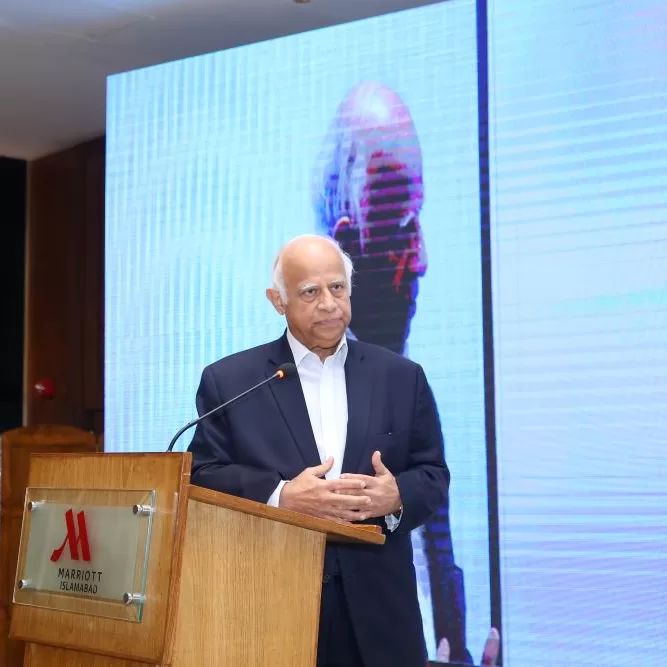
Ikram Sehgal Patron-in-Chief, KCFR Co-Chairman, Pathfinder Group
Anwaar ul Haq Kakar, Dr. Faisal Mushtaq, and Dr Huma Baqai. I got a lot more than I bargained for when I first met Anwaar ul Haq Kakar in Baluchistan. At the time, I was a member of the CPNE, serving as one of the vice presidents and perhaps the only former army officer still on the executive committee. The government of Baluchistan was a surprise to us all; we didn’t have high expectations, but Kakar’s engagement with us exceeded anything we had imagined. His support encouraged me greatly, and we remained friends thereafter. He constantly encouraged me to share my story, even in Davos, and he urged Jam Kamal to come, who performed excellently. Later, when Kakar became the caretaker prime minister, I invited him again, and he graciously accepted.
To build on his words in another way: Pakistan is at the epicenter of a region housing 5 billion of the world’s 8 billion people, surrounded by China, India, Indonesia, Southeast Asia, the Middle East, much of Africa, and Central Asia. Pakistan itself holds significant resources: we have the second-largest copper and gold reserves in the world, the third-largest coal reserves, the fourth-largest cotton production, the fifth-largest milk production, and the sixth-largest rice production globally. We have also developed nuclear capabilities specifically for national security, with the means to deliver them.
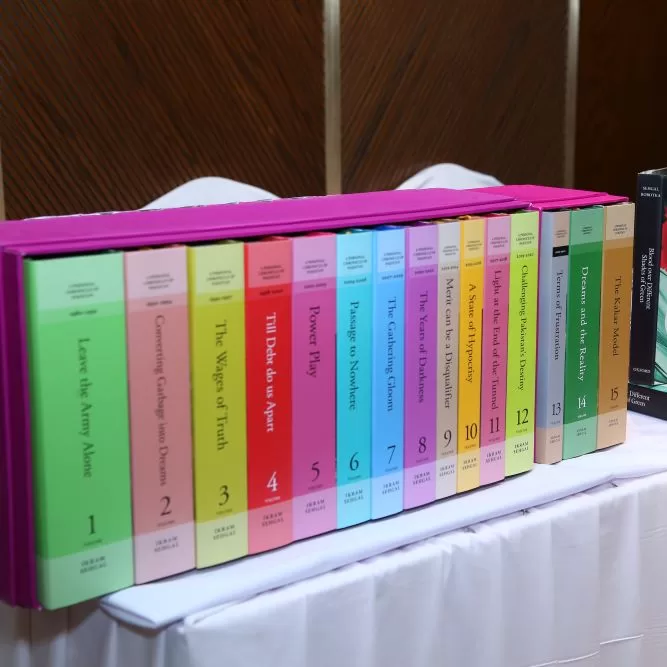
Another aspect to consider is the nation’s talent. When my late friend Arif Nizami asked me to write for his new venture, The Nation (an English-language publication), I asked him what he wanted me to write about. He simply said, “Just write something.” So, I began contributing an Economic Letter, drawing on my background in counter-trade, which I was involved in after leaving the army.
I’ll admit, at that time, my knowledge of business was so limited that I thought an LC (Letter of Credit) was a person! Yet, just a few articles in, I started writing consistently, and by 1989, I was regularly sharing my thoughts one of which was titled, “Leave the Army Alone.” I learned that lesson: if you look at China a great country you see a guarantor for its economy. The same is true for Singapore.
To preserve social order, some freedoms must be sacrificed, and I completely agree with that perspective. I’ve been saying this for 36 years: I believe in democracy, in the rule of law not just the wording of the law, but its spirit. It’s easy to get caught up in the technicalities commas, apostrophes, and minor clauses but it’s the spirit of the law that truly matters.
I feel fortunate to have hosted the Pakistan Breakfast for the past 20 years and to have been involved with the Pakistan Pavilion, as Huma Baqai mentioned, for around 8 years. I miss the late Mr Javed Akhai, who encouraged me to expand our presence by establishing the Pakistan Pavilion. Previously, we held smaller breakfasts, and he suggested broadening our efforts. We reached out to many Pakistani business leaders to get involved, some agreed, others declined, and still others were only partially interested. But few were willing to truly invest in it; they’d rather spend that amount on a single night’s event than on a meaningful contribution to the country.
What truly motivated me was observing the Indian business community. In Davos, there were about 180 Indian businesspeople, compared to just five of us representing Pakistan. Among them, only one, Hussain Dawood, consistently contributed toward Pakistan, while others did little to support the country. Many spent lavishly but were reluctant to invest in initiatives for Pakistan. So, we decided to keep it within the private sector, with occasional moral support from the government, which, while limited, has been helpful. We’ll continue striving for this support, as it’s a challenge to sustain these efforts year after year.
One example of our progress is the Asaan Mobile Account (AMA), which has caught the attention of the World Economic Forum, as they’ve begun projecting it on the global stage. They’re often surprised that this innovation hasn’t been promoted more actively within Pakistan. On a positive note, we’re seeing new energy in the State Bank; a younger generation has stepped up and is pushing for progress. We’re hopeful that, in the coming weeks and months, we’ll see meaningful advancements.
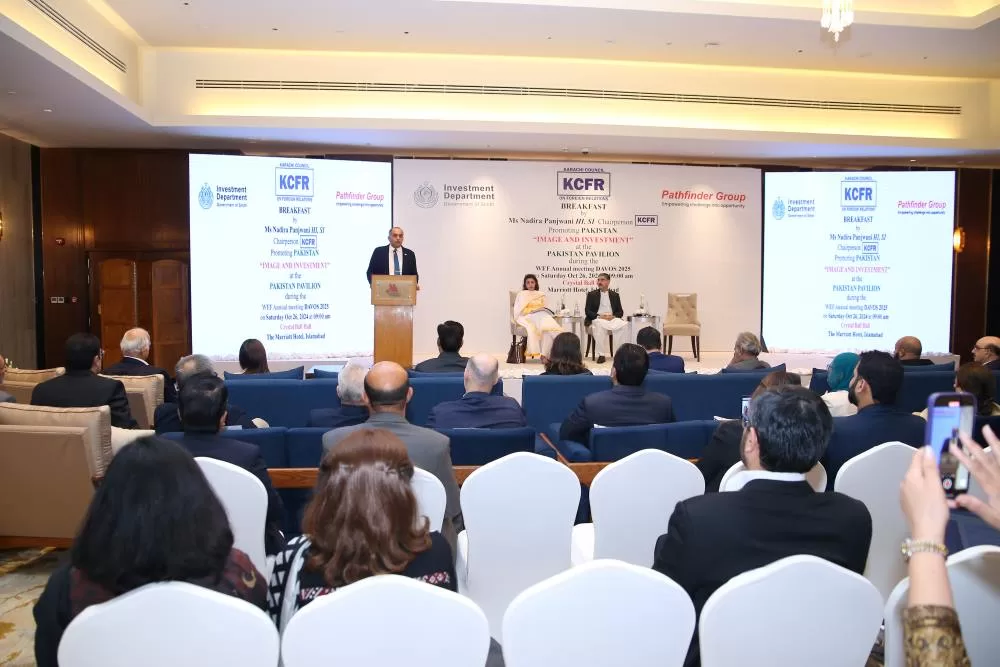
Today, I am proud to showcase the talent of Pakistan. The people behind this platform have an average age of just 28, and they’ve created something remarkable: the ability to open a bank account in under two minutes, right from a phone, no need for a smartphone; a feature phone will do. This platform connects users across all five telecom networks and links them to 16 banks, with 35 banks set to join soon, three of which have already received special permissions. When we began, 80% of the adult population lacked bank accounts. Now, that figure has dropped to 70%, with significant growth in women’s financial inclusion: previously, only 18% of women had accounts; today, that number is 38%. Through this platform, we’re advancing financial inclusion and women’s empowerment, aligning with the four pillars of the World Economic Forum: financial inclusion, women’s empowerment, health, and education. We’re already working on two of these pillars, and with our new partnership with Dr. Faisal Mushtaq, we’ll soon tackle the third education. I’m incredibly proud of my son, who has been instrumental in these efforts. Although he’s staying abroad for now, it’s because my granddaughter’s health requires it. Dr. Faisal Mushtaq inspires me greatly with his commitment to driving education in Pakistan. His vision of education goes beyond textbooks; it’s about understanding and engaging with the world around us.
Yesterday, I visited Lawrence College Ghora Gali, where the focus on education was quite different from today. In our time, if you graduated with a First Division, that was considered an achievement. However, we had representatives on the cricket team, the national hockey team, the athletics team, and even in basketball. We excelled in every sport, except for swimming, where we faced significant challenges due to the lack of a swimming pool. To address this I took the initiative to donate a swimming pool to Lawrence College. This may seem like a small gesture, but you can’t imagine the excitement among the students during the ceremony. They expressed how they had always dreamed of having a swimming pool. I was genuinely surprised by their reaction, but it underscored a vital point: we must invest in our youth in a comprehensive manner. Recently, at my home in Angoori, about 35 minutes from here (Islamabad), we launched an auditorium that can seat around 150 people. Dr. Faisal Mushtaq and I were present, and it was heartwarming to hear the national anthem sung by 120 children and faculty members. I firmly believe that the future of Pakistan lies in our youth, and it is essential to project their talents and potential. Unfortunately, we often overlook our youth. We have the resources, but navigating the bureaucracy can be a challenge. For instance, we proposed an $8 billion investment over 25 years for a project that would address various socio-economic issues. The plan involved developing three or four industrial cities along the coast of Balochistan, with residential areas situated to the south. The vision was to create around 500,000 homes specifically for the people of Balochistan, ensuring that ownership remained with them. These homes would be given to the locals, with the assurance that they would receive rent for 25 years before they could move in. #
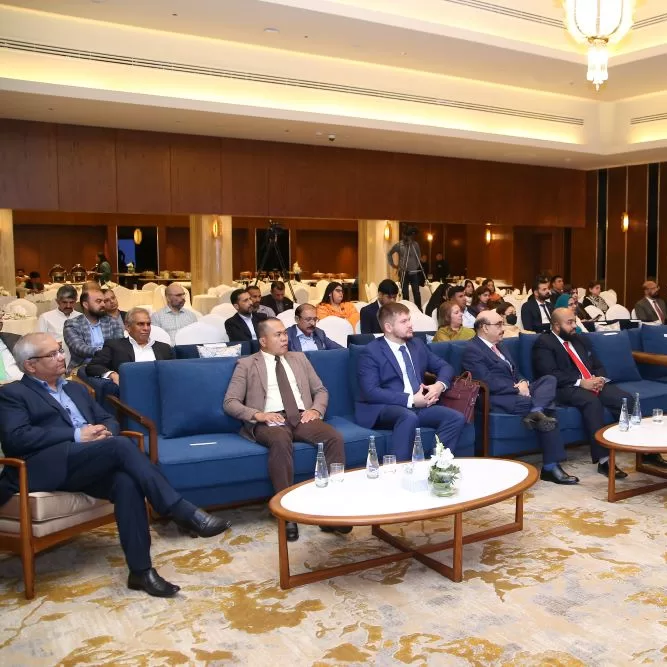
However, when we presented this idea, the Chief Secretary asked us to explain the concept and navigate the bureaucratic channels in Islamabad. They were also concerned about building a railway line, which meant convincing railway officials about the importance of the investment. It was frustrating that some officials couldn’t grasp the magnitude of an $8 billion investment coming into the country. Fortunately, the Sindh Investment Department understood our vision and invested in KCFR. The Chief Minister at the time also supported our initiatives, and we aimed to replicate this investment model for Balochistan as well. What I’m trying to convey is that there is much potential for impactful work at Davos, and we need support to make it happen.
To rephrase what Dr. Huma Baqai said about Shahid Khaqan Abbasi: when asked why the government allocates funds for certain initiatives, he pointedly replied, “What is happening will not happen also.” Unfortunately, this reflects a broader issue, we need to minimize the role of the bureaucracy. While there are many capable individuals in the bureaucracy, they require more freedom to operate effectively. Governance should not be overly constrained by bureaucratic red tape, and similarly, the military should not be involved in governance.
As we move forward, I am optimistic about collaborating with Dr. Faisal Mushtaq on initiatives in Davos. I want to publicly state that we hope to build on our previous partnership with Martin Dow to further develop these ideas. At the Future World platform, I noticed that many of your students are engaged in IT, Cyber-Security, and Artificial Intelligence. These areas are crucial, and we aim to integrate health into our educational framework in innovative ways, which I will elaborate on later. I firmly believe that significant progress can be made in the private sector. I am deeply grateful to my company staff for their willingness to contribute, and I appreciate the support from Faisal and the Providentia Book Foundation.
Let me share something truly remarkable. It all began with the Book Foundation where children started donating their blazers and jerseys. As a result, we are now able to collect books from these donations, separating textbooks for underprivileged children and creating libraries in various schools. We are also taking the blazers and jerseys to children in the mountains and distributing them, this is already underway. Moreover, we have a startup funded by external sources that aims to experiment with diabetic care in Pakistan. They plan to open free diabetic centers, which are already established in 24 locations. We will discuss how we can expand this initiative further, as diabetes is a significant health issue in our country. By integrating these efforts, I believe we can achieve a great deal.
I want to conclude by sharing a personal experience from my upbringing. My mother was from East Pakistan, now Bangladesh, while my father hailed from Sialkot. Growing up, it was challenging; when we visited East Pakistan, my sister and I were seen as Punjabis, and upon returning to West Pakistan, we were labeled Bengalis. Fortunately, we had supportive parents who helped us navigate these complexities. Tragically, my sister passed away at the age of 28 and was buried in Dhaka, Bangladesh. Despite the challenges, we maintained our cultural ties.
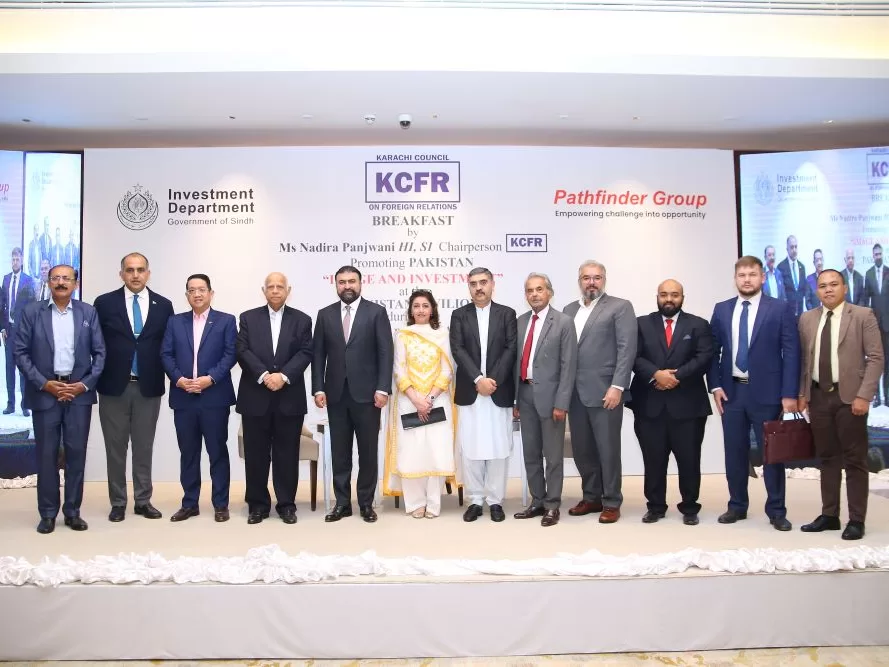
From a young age, I learned about the separation of governance and democracy. My father, who was active in the military, raised a regiment in 1949 that later played a significant role in governing Bangladesh. Zia-ur-Rehman was his Adjutant and General Ershad was his Adjutant also. The very regiment I grew up in was eventually commanded by these individuals. As I observed their governance in Bangladesh, I witnessed how they distinguished their roles. They believed they were not suited for managing power stations or banks directly but rather overseeing those who could. To prevent things from going awry, I believe it’s essential to accept certain realities as we grow up. Today, China serves as a perfect example of adapting and thriving. In contrast, Russia did not follow this path, which contributed to the fall of the Soviet Union. While the Soviet Union put ‘Glasnost’ in front of ‘Perestroika’, China put ‘Perestroika’ in front of ‘Glasnost’. Now, Russia is going back to ‘Perestroika’.
We must recognize that we are at the center of significant geopolitical developments. Aside from the recognition by our Foreign Office, the World Economic Forum has identified us as part of the Eurasian Corridor. This designation emphasizes that our role in the China-Pakistan Economic Corridor (CPEC) extends beyond mere economic projects. It’s about the broader North-South Corridor connecting us to Russia through Central Asia. This Corridor links us to Europe and further extends from Gwadar to Oman and Saudi Arabia, reaching into Africa as well. I sincerely appreciate your time and participation today. This event marks the beginning of what we envision broader initiative, and I’m grateful to you, Anwaar ul Haq Kakar, for your presence, as well as to Dr. Faisal Mushtaq. When I see you (Dr Faisal Mushtaq) committed, brilliant, and persistent individuals like you, I feel a renewed sense of hope for Pakistan. Your work at the Millennium Institute of Technology and Entrepreneurship (MITE) in Karachi, along with Dr Huma Baqai’s involvement, has been inspiring over the past three years.
Thank you to everyone who has joined us today, thank you, Farhat Ali, thank you, Ambassador Masood Khan, who has been a regular at the KCFR, and to the High Commissioner of Maldives, whose presence is an honour. We’ve welcomed representatives from the Philippines, Russia, Nepal, and other nations, creating a diverse community here. Thank you all for coming and for your continued support.




